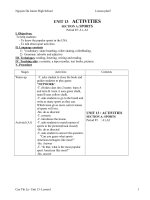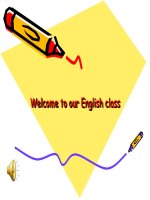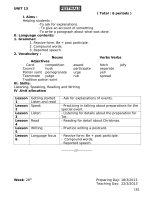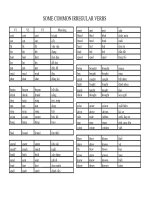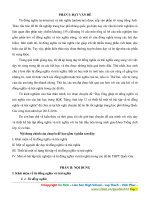- Trang chủ >>
- Khoa học tự nhiên >>
- Vật lý
unit 13 activities tiếng anh 7 sách cũ nguyễn văn liệt thư viện giáo án điện tử
Bạn đang xem bản rút gọn của tài liệu. Xem và tải ngay bản đầy đủ của tài liệu tại đây (121.3 KB, 4 trang )
<span class='text_page_counter'>(1)</span><div class='page_container' data-page=1>
Period: 85
<b>UNIT13. ACTIVITIES</b>
<b>B1, 2</b>
<b>I. Objectives</b>
<i><b>1. Knowledge, Skills, Attitude: </b></i>
<i><b>a. Knowledge:</b></i>
- By the end of lesson, Ss understand the main ideas of the dialogue, make accepting and refusing
an invitation by listening.
<i><b>- Vocabulary: </b></i>review
<i><b>- Grammar: model verbs</b></i>
<i><b>b. Skills: listening, speaking, reading and writing</b></i>
<i><b>c. Attitude: Ss understand the main ideas of the dialogue, make accepting and refusing an invitation</b></i>
by listening.
<i><b>2. Capacity is formed and developed for students</b></i>
- Self-learning capability.
- Communicative competence
- Cooperation capacity
<b>II. Preparation</b>
<i><b>1. Teacher: lesson plane, book, color chalks, pictures, MP3</b></i>
<i><b>2. Students: books, notebooks, pen, ruler …</b></i>
<b>III. Students’ activities</b>
1. Warm up (5’)
<b> Teacher’s and students’ activities </b> <b> Contents</b>
- Ask Ss say some sports in VN
- Help Ss to say it Swimming, soccer, volleyball…
<i><b>2. Knowledge formation activities (36’)</b></i>
- Introduce the topic
- Let students look at the pictures and asks what
Ba and Nam doing, then introduce the situation.
- Ask Students observe the pictures and answer
the question and listen to the introduction.
- Let them listen to the cassette twice, and then
have them repeat.
- Call some pairs play the role before class
about Nam and Ba
- Give Pairs work: practice with partner.
- Ask them to pick out the modal verbs and
give the information of three forms as quickly
as possible.
- Have Students ask – answer the questions
(using the idea given in the dialogue)
- Give Students take notes.
<b>1: Listen. Then practice with a partner.</b>
<i>* Ss understand the main ideas of the dialogue and </i>
<i>answer the questions.</i>
a. Nam should finish his homework before he plays
table tennis.
b. Nam will be ready in a few minutes.
c. Ba will finish a question for Math.
d. Ba has 2 paddles
- Call Ss to use Modal verbs: Can, must, have
to, ought to, might …
+ Affirmative: S + might / can/must/should/
have to/ has to/ ought to + v (bare inf)
+ Negative:
S + mightn’t/ can’t/ shouldn’t/ mustn’t
oughtn’t to/ don’t have to/ doesn’t have to + v
+ Interrogative:
Can / Must / Should + S + V (bare inf)?
Do / does + S + have to + v (bare inf.).
- Let students listen to the cassette twice.
<b>2: Listen. Then practice with a partner. Change the </b>
<b>underlined details using the information in the box.</b>
+ Affirmative: S + might / can/must/should/ have to/
has to/ ought to + v (bare inf)
+ Negative:
S + mightn’t/ can’t/ shouldn’t/ mustn’t oughtn’t to/
don’t have to/ doesn’t have to + v
+ Interrogative:
Can / Must / Should+ S + V (bare inf)?
Do / does + S + have to + v (bare infi).
</div>
<span class='text_page_counter'>(2)</span><div class='page_container' data-page=2>
- Tell them to replace the underlined words by
the cues given to make other dialogues.
- Give example a)
- Have Ss Pairs work: practice their own
dialogue before the class.
- Ask and answer by using the modal verbs to
write the invitation.
- Correct their mistakes if there is.
to help you.
Ba: Come and play volleyball,Nam.
Nam: I’m sorry. I don’t think I can.
Ba: That’s too bad. Why not?
Nam: Well, I should visit my grandmother.
Ba: Can you play on the weekend?
Nam: Yes I can.
Ba: All right. See you on Saturday afternoon.
Nam: Ok. Bye.
Ba: Bye.
<i><b>3. Consolidation: 4’</b></i>
- Have Ss make their own dialogues using the pictures and the information in the box
- Call on some pairs to practice their own dialogue.
- Give feedback
<b>IV. Experience:</b>
………
………
………
<b> </b>
Period: 86
<b>UNIT13. ACTIVITIES</b>
<b>B3</b>
<b>I. Objectives</b>
<i><b>1. Knowledge, Skills, Attitude: </b></i>
<i><b>a. Knowledge:</b></i>
- By the end of lesson, Ss know a dangerous sport and understand how to use model verbs.
- Vocabulary: oceans, under water, pearl diver, scuba- diving, vessel, explore, invent, thanks to
- Grammar: model verbs
<i><b>b. Skills: reading and writing</b></i>
<i><b>c. Attitude: Ss know a dangerous sport and understand how to use model verbs.</b></i>
<i><b>2. Capacity is formed and developed for students</b></i>
- Self-learning capability.
- Communicative competence
- Cooperation capacity
<b>II. Preparation</b>
<i><b>1. Teacher: lesson plane, book, color chalks, pictures, MP3</b></i>
<i><b>2. Students: books, notebooks, pen, ruler …</b></i>
<b>III. Students’ activities</b>
1. Warm up (5’)
<b> Teacher’s and students’ activities </b> <b> Contents</b>
- Have Ss play the game “ Jumbled words”
- Guide Ss play the game
- Remark
- miwsningm <sub></sub> swimming
- netsin <sub></sub> tennis
- fotolabl <sub></sub> football
- skingipp <sub></sub> skipping
- madinbont <sub></sub> badminton
<i><b>2. Knowledge formation activities (36’)</b></i>
- Elicit some words in the text and explain
them by explanation, pictures, translation …
- Read model, chorus, individual
- Check pronunciation
<b>3. Read. Then answer the questions</b>
<i>* Ss know a dangerous sport and understand how to use</i>
<i>model verbs.</i>
<b>* New words.</b>
- pearl diver (n): thợ lặn ngọc trai
</div>
<span class='text_page_counter'>(3)</span><div class='page_container' data-page=3>
- invent (v): phát minh
- scuba- diving (n): mơn lặn có sử dụng bình dưỡng khí
- deep sea diving vessel: tàu ngầm
- explore (v): thám hiểm, khám phá
- thanks to : nhờ vào
- Put the chart with statements on the
board
- Have Ss listen to the tape ( book closed)
and decide which is True and which is
False
- Give feedback
<b>* True/ false statements.</b>
1. Most of the world’s surface is land
2. Before the invention of special ….under water.
3. Now, scuba- diving is a popular sport.
4. Jacques Cousteau invented special TV cameras
e. We can learn …. invention.
Keys:
a. F (Most of ….. is water)
b. T; c. T
d. F ( Jacques invented a deep- sea diving vessel)
e. T
- Ask Ss to read the text silently
- Call on some Ss to read the text aloud
- Correct pronunciation
- Put a poster with questions on the board
- Ask Ss to answer the questions.
- Call on some Ss to give the answers
- Give feedback
Keys:
a. A pearl diver could stay underwater for about 2 minutes.
b. Now, a diver can stay for a long time
c. He invented the deep-sea diving vessel in the early 1940s
d. He died in 1997.
<i><b>3. Consolidation: 4’</b></i>
- Ss read the test in front of class.
<b>IV. Experience:</b>
………
………
………
Period: 87
<b>UNIT 14: FREE TIME FUN</b>
<b>(A1)</b>
<b>I. Objectives</b>
<i><b>1. Knowledge, Skills, Attitude: </b></i>
<i><b>a. Knowledge:</b></i>
- By the end of lesson, Ss tell the activities in their free time and talk about TV programs
<i><b>- Vocabulary: adventure, cricket, series, news, prefer to</b></i>
<i><b>- Grammar: + prefer + to- infinitive / gerund</b></i>
<i><b>b. Skills: listening, speaking, reading and writing</b></i>
<i><b>c. Attitude: Ss tell the activities in their free time and talk about TV programs</b></i>
<i><b>2. Capacity is formed and developed for students</b></i>
- Self-learning capability.
- Communicative competence
- Cooperation capacity
<b>II. Preparation</b>
<i><b>1. Teacher: lesson plane, book, color chalks, pictures, MP3</b></i>
<i><b>2. Students: books, notebooks, pen, ruler …</b></i>
<b>III. Students’ activities</b>
<i><b>1. Warm up (5’) Brainstorming</b></i>
<b>Teacher’s and students’ activities</b> <b>Content</b>
- Have Ss play the game “ Brainstorming”
- Tell some TV programs
- Work in groups
- Give feedback
Film
* - Program on TV
Cartoon
<i><b>2. Knowledge formation activities (3’)</b></i>
</div>
<span class='text_page_counter'>(4)</span><div class='page_container' data-page=4>
- Explain them by pictures, explanation….
- Read model, chorus, individual
- Check pronunciation
- Put the chart with statements on the
board.
- Have Ss read the dialogue. Then choose
which is True and which is False.
- Work in pairs
<i>* Ss tell the activities in their free time and talk about TV </i>
<i>programs</i>
<b>* New words.</b>
- series (n): phim truyền hình nhiều tập
- adventure (n): cuộc phiêu lưu
- cricket (n): con dế
- prefer to (v): thích hơn
- news (n): tin tức
- Have Ss listen to the tape twice
- Ask Ss to work in pairs to practice
dialogue before class.
- Correct pronunciation.
- Ask Ss to give the answers and correct the
false sentences
- Give feedback
- Put a poster with questions on the board.
- Let Ss work in pairs. Ask and answer the
questions.
- Call on some pairs to ask and answer
before class
- Give feedback
- Let Ss read the dialogue again
- Ask Ss to choose the best answer for each
sentence.
- Call on some Ss to give their answer
- Remark and give feedback
<b>* True/ False statements.</b>
1. Lan invites Hoa to eat dinner with her friend
2. They can watch News in English
3. Hoa doesn’t have a TV at her place
4. Hoa’s family usually goes shopping during dinner
5. Lan’s family sometimes watches TV.
<b>* Keys:</b>
1. T
2. F (they can watch “The Adventure of the Cricket”).
3. T
4. F (They talk about their day, usually read, and
sometimes play chess)
5. F (Lan’s family watches TV every night)
<b>* Ask and answer.</b>
1. What time does “The Adventure of the Cricket” begin?
It begins at 6.15 pm
2. Does Lan invite Hoa to eat dinner with her family?
Yes, She does
3. Do Hoa’s aunt and uncle like watching TV?
No, They don’t
4. What does Lan’s family do every night?
Lan’s family watches TV every night.
<b>* Keys: a/ C d/ C b/ A e/ D c/ B</b>
<i><b>3. Consolidation (4’)</b></i>
- Ss practice the dialogue again.
<b>IV. Experience:</b>
………
………
………
<b>Signature of the Leader</b>
</div>
<!--links-->
